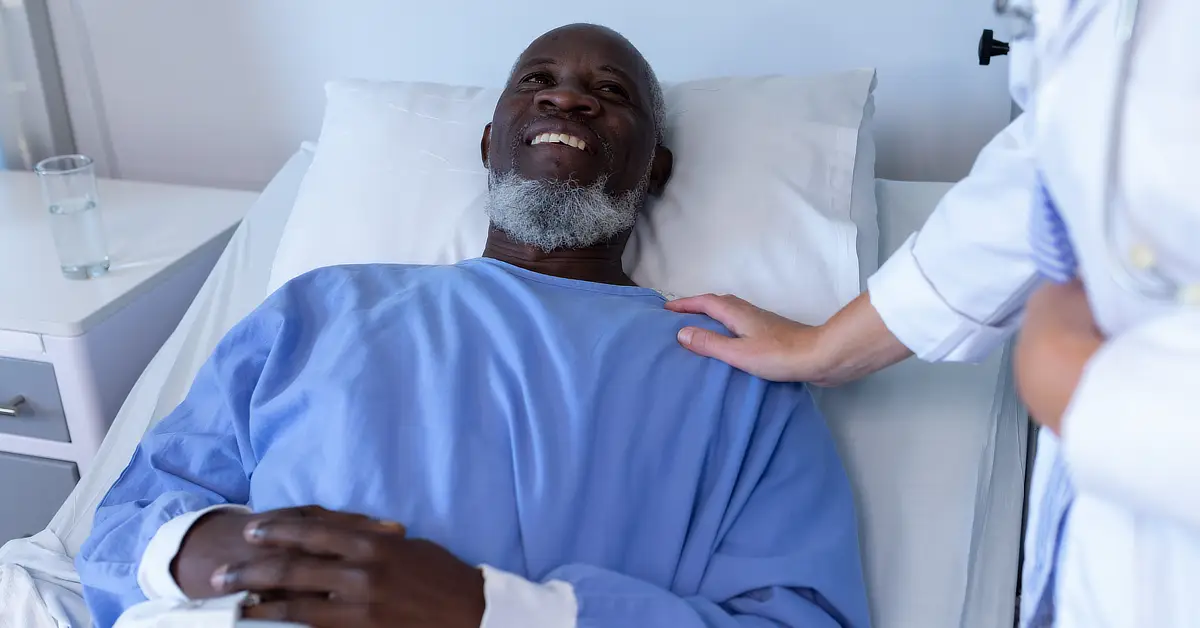Prostate cancer is one of the commonest types of cancer in men. About one in nine men are diagnosed with prostate cancer. Fortunately it can often be treated successfully if diagnosed in its early stages.
The prostate is a small walnut-shaped gland in males. It is about the size of a walnut in young males but can be larger in older men. It is located below the bladder and in front of the rectum.
Its function includes producing the fluid that nourishes and transports sperm and secreting prostate specific antigen (PSA), a protein that helps semen retain its liquid state. It also helps aid urine control.
Prostate cancer begins when cells in the prostate gland start to grow out of control.
The risk of prostate cancer increases after the age of 50. It is rare before the age of 45. If you have a close relative with a history of prostate cancer, you have a higher chance of developing it.
Causes
Like all types of cancers, the exact cause of prostate cancer is not easy to determine. In many cases multiple factors may be involved.
Cancer anywhere in the body starts when cells begin to grow out of control. Cells in nearly any part of the body can become cancer cells and can then spread to other areas of the body.
Prostate cancer begins when cells in the prostate gland start growing uncontrollably and abnormally. These abnormal or cancerous cells continue to grow and divide until a tumour develops.
If you have an aggressive type of prostate cancer the cells may metastasise or spread from the original tumour site to other parts of the body.
Symptoms
Prostate cancer is usually a slow growing cancer, often causing no symptoms until it is in an advanced stage.
Men who do experience symptoms may notice difficulty starting and maintaining urination, a frequent urge to urinate especially at night, blood in the urine or semen, painful urination, in some cases pain on ejaculation, difficulty getting or maintaining an erection as well as pain or discomfort when sitting if the prostate is enlarged.
In its advanced stage prostate cancer can involve bone fracture or bone pain especially in the hips, thighs or shoulder, swelling in the legs or feet, weight loss, tiredness, changes in bowel habits and back pain.
Once prostate cancer begins to grow quickly or spread outside the prostate it is dangerous.
Treatment
Treatment for prostate cancer depends, among other factors, on the stage of the cancer. In its early stages (when it is found only in the prostate gland) it can be treated with very good chances of survival. Cancer that has spread beyond the prostate such as to the bones, lymph nodes and lungs is not curable but it may be controlled for many years.
In the early stages when the cancer is small and localised a doctor may recommend watchful waiting or monitoring. The doctor may check PSA blood levels regularly but take no immediate action.
Alternatively a surgeon may carry out a prostatectomy. This involves removal of the prostate gland using laparoscopic, open or radiation surgery. Surgery is a common choice if the cancer is not thought to have spread outside the prostate gland.
In its advanced stage, prostate cancer treatment may involve chemotherapy that can kill cancer cells around the body or hormonal therapy. Hormonal therapy involves blocking or reducing the main male hormones. Doing so appears to stop or delay the growth of cancer cells.
Because of the many advances in available treatments, most men whose prostate cancer becomes widespread can expect to live five years or more. Some men with advanced prostate cancer live a normal life and only die of another cause.
Effects on fertility
The prostate gland plays a role in sexual reproduction. Prostate cancer and many of its treatments affect fertility in several ways. For example if a man has surgery to remove either the prostate gland or the testicles it will affect semen production and fertility.
Radiation therapy can affect prostate tissue, damage sperm and reduce the amount of semen for transporting it. Hormonal therapy can also affect fertility.
There are however some options for preserving these functions. This includes banking sperm before surgery or extracting sperm directly from the testicles for artificial insemination.
If you would like to have children after prostate cancer discuss your options with your doctor when he advises you on the proposed treatment plan.
Lowering your risk of prostate cancer
There is no sure way to prevent prostate cancer. Many risk factors such as age and family history cannot be controlled but there are some things you can do that may lower your risk of prostate cancer.
Some studies have found that men who are overweight or obese have a higher risk of developing advanced prostate cancer. To reduce your risk, maintain a healthy weight; keep physically active; follow a healthy eating pattern, which includes a variety of colourful fruits and vegetables and whole grains, and avoid or limit red and processed meats and highly processed foods.





